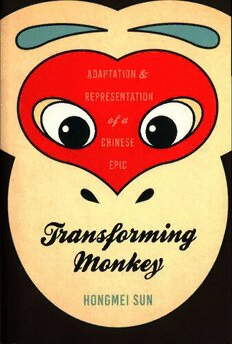
Transforming Monkey: Adaptation and Representation of a Chinese Epic PDF
Preview Transforming Monkey: Adaptation and Representation of a Chinese Epic
& ADAPTATION REPRESENTATION iui< — CHINESE C f T > EPIC S F u t n s f o t m i n g t H o n k t y SUN GO C D university?" PENNSYLVANIA. LIBRARIES Transforming Monkey Transforming Monkey ADAPTATION AND REPRESENTATION OF A CHINESE EPIC Hongmei Sun UNIVERSITY OF WASHINGTON PRESS Seattle f l l 1 I modern language I I I I initiative THIS BOOK IS MADE POSSIBLE BY A COLLABORATIVE GRANT FROM THE ANDREW W. MELLON FOUNDATION. Copyright © 2.018 by the University of Washington Press Printed and bound in the United States of America zz 21 zo 19 18 5 4 3 2 1 All rights reserved. No part of this publication may be reproduced or transmitted in any form or by any means, electronic or mechanical, including photocopy, recording, or any information storage or retrieval system, without permission in writing from the publisher. University of Washington Press www.washington.edu/uwpress Cataloging-in-Publication Data available from the Library of Congress. ISBN (hardcover): 978-0-195-74318-9 ISBN (paperback): 978-0-295-74319-6 ISBN (ebook): 978-0-295-743Z0-Z To my parents. With you there, I will never feel lost. To my three sisters. We do not mention the love between us, only because we know it is always there. CONTENTS Acknowledgments ix Introduction 3 1. Who Is Sun Wukong? The Image of the Monkey King in Journey to the West 15 2. The Transmutable Monkey: Between Theater and Fiction in Traditional China 3 6 3. From Trickster to Hero: National Mythmaking in Wartime and Maoist China 60 4. From Fighter to Lover: The Postsocialist Hero in the PRC and Hong Kong 91 5. Chronotope and Orientalism: Time Travel between China and America 119 6. Of Monkey, Human, and God: The Performance of Asian American Identity 135 Conclusion 169 Notes 175 Selected Bibliography 195 Index ' 215 ACKNOWLEDGMENTS The writing of this book is a journey that can be compared to the jour ney of Monkey, one that has crossed many borders, lasted many years, and encountered many demons (obstacles). Along the jourriey I have been indebted to many whose guidance, support, and generosity have helped me getting started and moving forward. My deepest gratitude to my teachers, mentors, and friends, who have inspired, encouraged, and challenged me during the earlier stages of writing: Elizabeth Petroff, William Moebius, Edwin Gentzler, Enhua Zhang, Floyd Cheung, Paola Zamperini, Maria Tymoczko, Jules Chametzky, and Jonathan Lipman. Without you, this book would not exist. Many thanks to all my friends who have shared with me your laughter and dragged me along through the most difficult days, especially Kanchuka Dharmasiri, Swati Burla, Srinivas Lankala, Antonia Carcelen Estrada, Nicole Calandra, and Bunkong Tuon. I am grateful to my mentors, colleagues, and friends at George Mason University and other places and institutions, with whose help and encouragement I was able to give the book its needed transforma tions, especially Carma Hinton, Rei Berroa, Karl Zhang, John Foster, Briankle Chang, John Crespi, and Jane Larson. My special apprecia tion goes to Douglas Eyman, who has been my many-time first reader and most reliable supporter. I would like to thank the two anonymous reviewers of the manuscript, whose insights have been essential for helping me realize its final form. I owe special thanks to my editors at University of Washington Press, Lorri Hagman and Niccole Coggins, for their passion and patience. Many thanks to Susan Murray for her diligent work as copy editor. An earlier version of my discussion of Lost Empire, and The For bidden Kingdom appeared in Asia Pacific Translation and Intercul- tural Studies, y.z (zoi6): 175-87. Transforming Monkey
